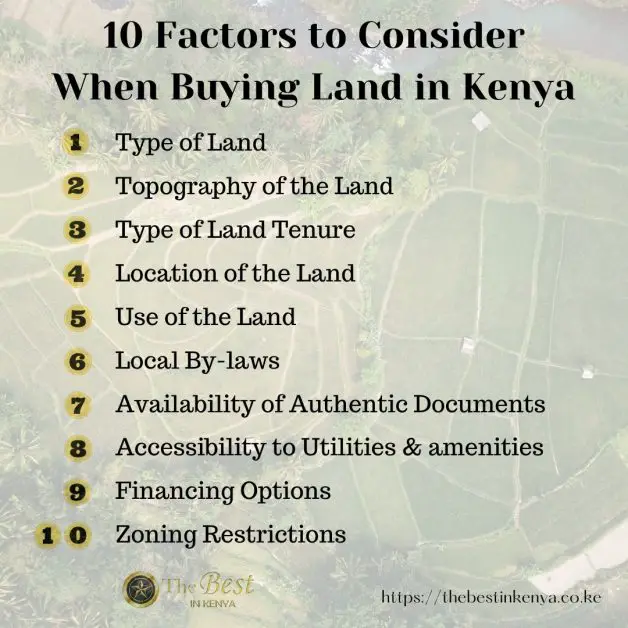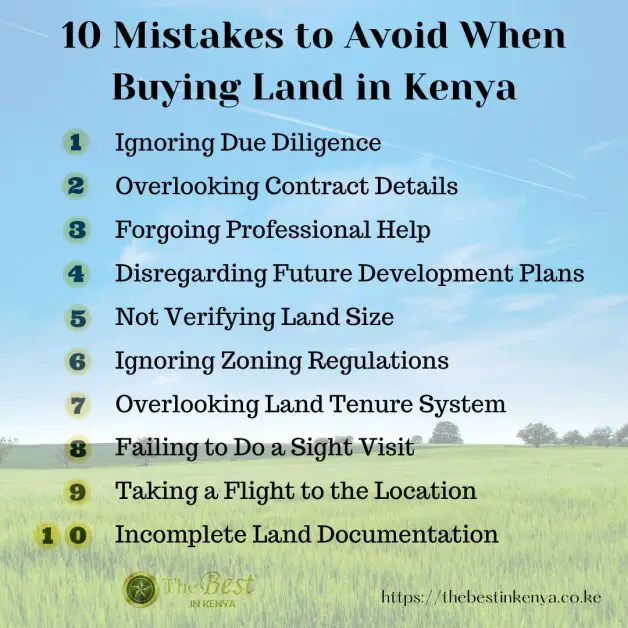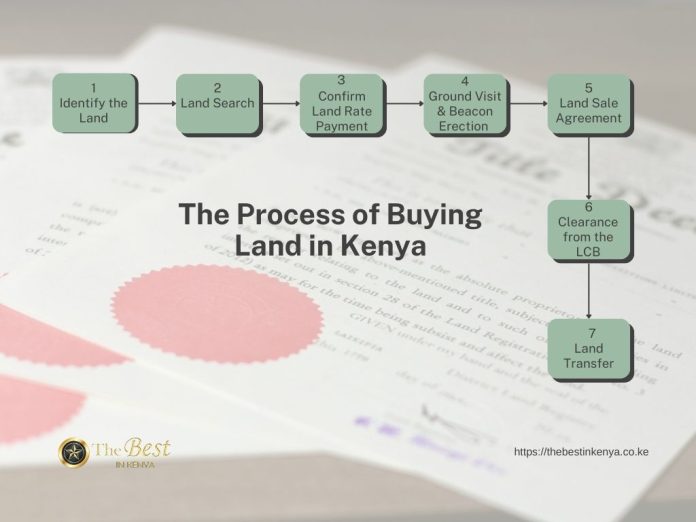There is that popular joke that when buying land in Kenya, you should befriend a lawyer, land valuer, surveyor, and local drunkard. The last one is the least qualified but the most important. This statement shows how the land-buying process in Kenya is tricky.
Recently, we have seen several land scandals that have left aspiring property owners in anguish. To help avoid these pitfalls, we consulted a seasoned city lawyer, Kioko Munyoki, to guide us through the ins and outs of the land-buying process. This non-biased guide will not only save you from the hands of the cons but also help you make the right land purchase decision.
How to Buy Land in Kenya Safely
1. Identify the Land You Want to Purchase
How can you identify the land you want to buy? First, you can engage a reputable real estate agent to help you get land in your preferred location. Most property brokers have land in different areas, and it is easier for them to recommend.
Secondly, you can search ” land for sale near me” to get ideas about places you can consider. However, this is a risky approach that requires in-depth research before contacting the listed sellers.
Another method you can use is getting referrals from your friends and family. The only downside with this technique is that most people tend to overtrust land sellers referred by loved ones and ignore the due diligence. Don’t fall into this trap.
Then, there is the age-old method of scouting your preferred area and hoping to connect with potential sellers. Although it used to work some years back, land brokers can take advantage of such an approach and mislead you.
According to Kioko, if you are to buy land safely in Kenya, you should ensure you get this step right.
2. Land Search in Relevant Registry
The launch of the Ardhisasa platform has made land search in Kenya easy. To register on the platform, you only need your Identification details (serial number of your current ID, ID number), official mobile number (registered using your ID number), and e-mail address.
The cost per search is Ksh 500, payable through M-Pesa, ATM, or credit card. You should fill out the search application form and provide a copy of the title deed, seller’s ID, and KRA PIN. After the search, you get the following details:
- Registered owner of the property
- Land size
- Any prohibitions, court orders, cautions, and caveats against the title (collectively called encumbrances).
A search only takes 3-5 minutes on the platform. This YouTube video has a step-by-step guide on how to do a land search.
3. Confirm Payment of All Land Rates
Has the Seller paid all the necessary land rates? You can get the answer to this question by visiting the county registry where the land is located. The annual land rates in Nairobi range from Ksh 2,500 to Ksh 3,500 for land not exceeding 0.2 hectares. In other counties, the rates are lower.
If the owner has defaulted, ensure they pay the arrears before you buy it so you don’t inherit their liabilities. The current land owner is responsible for clearing unpaid land rates before transferring the land to the new buyer. The transfer won’t go through if the rates are not paid in full. You will get a land and rent certificate of clearance once the amount is cleared.
4. Ground Visit & Beacon Erection
Even if the Seller is a trusted friend, never undertake any transactions before you visit the property. The ground visit helps you:
- Identify any issues with the land, like boulders and flooding
- Know whether the seller has encroached on public property like roads, rivers, or sewer lines
- Know the distance to public amenities and utilities
- Confirm the actual size of the land
At this stage, you should involve a land surveyor to measure the size of the land. You should also get the map of the property from your surveyor or the Ministry of Lands. After that, the seller should erect beacons to avoid any disputes in the future.
5. Land Sale Agreement
This process follows after you have agreed on the price of the land and financing option. It is advisable to involve the local administrators and family members to ensure no family disputes that could affect the transfer.
You should also agree on who will cover the stamp duty, usually 4% and 2% in urban and rural areas, respectively. Stamp duty is mostly the responsibility of the buyer to pay.
It is advisable to engage a lawyer to guide the process at this stage. So, the cost of hiring the lawyers is also a factor to consider. The charges vary between lawyers, but you can be sure to get a favourable quotation from your preferred lawyer.
A sale agreement is a legally binding contract that covers all the parties involved. Itcan be drafted by either the seller’s or the buyer’s lawyer as long as there is concurrence on the terms of the agreement. Where both parties have separate lawyers, each party bears their lawyer’s cost. The seller and the buyer may also decide to use the same lawyer, in which case they share the cost equally or on the proportion they may agree. You should ensure the sale agreement captures the following details:
- Buyer’s & seller’s legal names, addresses, and contact details
- ID Numbers of both parties
- KRA PINs of both parties
- Size & location of the land
- Cost of the land and financing option
- Who covers different costs
- Consequences of breach of the agreement
After signing the agreement, the buyer and the Seller should retain a copy. The lawyers should also have the documents.
After signing the agreement, the buyer is normally required to pay a deposit of at least 10% or whatever amount they may agree. This serves two purposes:
- Shows commitment on the part of the buyer
- Enable the seller to procure necessary completion documents such as rates clearance certificate and LCB consent.
The buyer shouldn’t fear giving the money at this point since there is already an agreement signed between them that stipulates what will happen should the sale fail, even at this stage.
6. Clearance from the Land Control Board
To ensure a transparent land transfer, request a forum with the county commissioner and elders. This step is essential when the land under question is considerable in size and value.
The objective of the meeting is to ensure all parties are okay with the transfer and that the seller is not doing it secretly. Most landboards across the country sit twice every month.
7. Land Transfer
Once the Seller has procured all the completion documents and the buyer is ready with cash to complete the purchase, the parties may agree to meet and complete the transaction. This is normally called the completion date when the land-buying and selling transaction is completed.
At the completion, the buyer should pay the seller the whole purchase price balance, i.e., the 90% remaining after the 10% paid upon signing the sale agreement. On their part, the seller should give the buyer the following documents, also called the completion documents:
- Original Title Deed of the land
- Copy of ID Card
- LCB Consent to transfer in favour of the buyer if the land is a freehold. For leaseholds, this consent is not required.
- Rates clearance Certificate evidencing that land rates have been paid in full
- KRA Pin Certificate
- Passport size colour photos
- Spousal consent, where applicable
At this stage, the seller must legally disclose any document anomalies. The cost of the land transfer in Kenya is between Ksh 1,000 and Ksh 2,000. According to the Ministry of Land Service Charter, the process usually takes around 15 working days, but it might take longer due to backlog.
10 Factors to Consider When Buying Land in Kenya
Brokers tend to push the idea that any land is worth investment. And many people have bought this idea. It is now common to see clueless buyers take a flight to Malindi to explore opportunities in the area without much thought. Before buying land in Kenya, here are the factors you should consider.

1. Type of Land
Are you looking for residential, industrial, agricultural, or commercial land? Some areas have restrictions on how you can use or subdivide the property. So, you need to know whether the area you are considering has by-laws that can affect the purpose of the land.
For example, although ⅛ an acre is the minimum land subdivision in most local authorities, this might not be the case in some areas, like agricultural land.
2. Topography of the Land
The best time to buy residential property is during the rainy season. It is easier to know the drainage capacity of the soil. For agricultural land, you can consider dry months because you can see the effects of limited water on the land.
Some of the physical features you should keep in mind are:
- Slope gradient
- Soil type and quality
- Natural drainage
These factors not only affect the quality of the land but also determine the construction costs. If a property is sloppy or has boulders, the levelling costs might significantly impact the construction costs.
Visiting the location is necessary to confirm the condition of the land. For diaspora landowners, you can send a trustworthy friend to assess the topography. You can also use Google Earth to visualize the property, but this doesn’t give a 100% clear picture.
3. Type of Land Tenure
You have probably encountered things like a freehold title deed. In Kenya, there are 4 types of land ownership systems:
- Freehold tenure: this type of ownership gives you lifetime access to the property. It is common in private land ownership and allows you to pass down the land to other persons.
- Leasehold tenure: this arrangement gives the buyer rights to own land for a specific period. In Kenya, the lease period is usually 99 years, with an option to extend.
- Communal ownership: In rural areas, this tenure is common. It allows the community to own land collectively. They can use the land to construct residential houses, farming, grazing, and communal facilities.
- Partial ownership: in cases where a company erects communication masts, they get partial rights to own the property.
4. Location of the Land
From Matuu, Malindi to Kajiado, the land appetite in Kenya is at its highest. Even before confirming the location, Kenyans flood different projects the moment they are launched. Words like “near the upcoming SGR station” are the new marketing gimmicks. But does it make sense to own land in any location?
Before committing your hard-earned money, you should confirm the accessibility of urban centres, schools, healthcare facilities, and all-weather roads. The safety and growth prospects of the locations are also essential factors to consider.
5. Use of the Land
Are you searching for residential, commercial, or agricultural land? Different counties have specific regulations and restrictions. Residential land should be in areas designated for housing, while commercial land suits businesses. Agricultural land allows farming activities. Ensuring alignment between land use and zoning regulations prevents legal complications.
6. Local By-laws
Local government regulations, known as by-laws, dictate land use, building codes, and other restrictions. Complying with these rules is essential to avoid legal issues. By-laws cover aspects like building height, setbacks, and land use restrictions. Researching and understanding local by-laws ensures your planned activities conform to legal requirements.
7. Availability & Authenticity of Documents
Solomon Wangwe, a property developer, once said that a title deed is one of the most useless documents when it comes to land transactions in Kenya. Although this may be an exaggeration, there are other essential documents in land ownership. We have seen numerous court cases where different people claim to have the original title deed of a piece of land. So, which documents should you consider?
- Greencard: it shows all the previous owners of a piece of land
- Registry index map: a visual representation of a piece of land in the registry
- Mutation form: change of title deed from one individual or group to another
- Land board consent: a document that shows all the interested parties have no reservations against the sale
Although some of these documents are not accessible to the public, you should try to find out if they are available and authentic.
8. Accessibility to Utilities and amenities
Availability and accessibility of water, sewerage, electricity, and internet are essential. For agricultural land, you should ensure the water is enough for irrigation unless you want to sink a borehole. You should also check the nearby schools, hospitals, markets, and public transportation systems when buying land.
9. Financing Options
Evaluate various financing options, including mortgages, land loans, or seller financing. Understand interest rates, repayment terms, and eligibility criteria. Choosing the right financing option ensures you can afford the land and manage repayments comfortably.
10. Zoning Restrictions
Although the land is yours, some restrictions can affect how you use it. For example, you can’t use your agricultural land to grow tea in areas outside the Nyayo tea zones.
Zoning intends to bring harmony in the use of land in different areas. Before purchasing any property, you should know the local regulations that govern how you can or can’t use the land.
Common Mistakes You Should Avoid When Buying Land in Kenya

1. Ignoring Due Diligence
You should never trust anyone when it comes to purchasing land in Kenya. Considering this is a significant financial decision, don’t leave any stone unturned. We have seen numerous land buyers crying foul over a promising land deal turning sour.
Some of the red flags to watch out include:
- Quick appreciation claims
- The original title is not available at the moment
- Land located near an upcoming road, railway, etc
- We offer free flights to the site
Although some of these claims might be genuine, they can be attempts to hike the prices or hide the actual location of the land.
2. Overlooking Contract Details
As the adage goes, the devil is in the details. You should read the sale agreement document word for word to avoid falling victim. If possible, consider using a lawyer to draft the contracts. Apart from that, they can interpret all the agreement clauses before you append the signature.
3. Forgoing Professional Help
It is tempting to say you want to save the costs of hiring a lawyer or surveyor, but that blunder can be costly. When you engage professionals, you avoid pitfalls like the legal implications of not following the proper process or getting the measurements wrong. When buying land in Kenya, these professionals should be a non-negotiable.
4. Disregarding Future Development Plans
What plans do you have with the piece of land? Some people buy land and use it for agriculture as they save to build. But imagine taking years to save and construct an apartment only to realize local regulations don’t allow high-rise structures? So, you should understand how local laws will impact your future plans.
5. Not Verifying Land Size
If you want to avoid land disputes, encroachments, and legal complications, you should confirm the actual size of the land. A professional surveyor can help you through this process. After that, you should erect beacons to demarcate the boundaries.
6. Ignoring Zoning Regulations
As earlier noted, zoning can affect how property in a particular location is used. So, you should understand all the by-laws in the area to ensure you are compliant. You can check the Kenyan Constitution, Physical Planning Act, Land Act, and Environmental Management and Coordination Act regulations.
7. Overlooking Land Tenure System
You can buy land and assume you own it for life, but then future generations realize they need to renew the tenure. When purchasing property, you should check whether it is freehold, leasehold, or communal. Currently, there is a widespread subdivision of communal, and you should ensure it is an agreement by the owners.
8. Failing to Do a Sight Visit
Visiting the land before committing any finances should be a non-negotiable. Site visits can reveal essential information like distance from the main road, type of soil, availability of social amenities, and number of plots. Apart from that, you experience the climate of the location first-hand.
9. Taking a Flight to the Location
It might look like a good idea to take a flight to Malindi to view a piece of land until you realize the reason behind it. Most land brokers take potential customers to the site through flights to conceal the distance from accessible roads and other amenities. Always insist on using road transport to get accustomed to the routes and identify any hindrance to accessing the property.
10. Incomplete Land Documentation
“We can first use the available documents as we wait for the bank to discharge the original documents.” This statement is a recipe for disaster when buying land in Kenya. You should verify the seller has all the documents necessary to facilitate the transfer before making payment.
FAQs
What is the meaning of land beacons, and what is their use?
A beacon is a physical demarcation of the boundary of the land. It is used to avoid disputes, especially when many plots are in the same area.
Can Foreigners buy land in Kenya?
Foreigners can buy and own land in Kenya according to the 2010 Constitution. However, you can only own land through the leasehold system for 99 years. Many foreigners are taking advantage of the lucrative real estate business in Nairobi to buy land in Kenya.
Do I need a lawyer when buying land in Kenya?
Although it is not mandatory to have a lawyer when buying land in Kenya, it is necessary. The lawyer helps you navigate the legal intricacies of purchasing property and avoid the pitfalls.
Conclusion
When purchasing land in Kenya, you should be cautious. Recently, several scandals have rocked the industry and left many Kenyans frustrated. You can consider involving professionals in the process to avoid falling victim. If you follow the steps listed here, you will reduce the chances of getting conned.
























